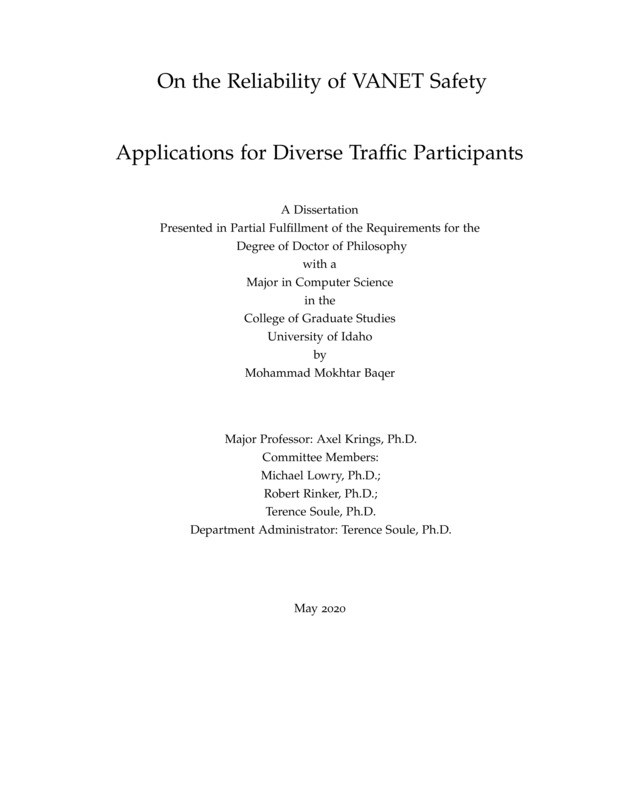On The Reliability of VANET Safety Applications for Diverse Traffic Participants
Baqer, Mohammad. (2020-05). On The Reliability of VANET Safety Applications for Diverse Traffic Participants. Theses and Dissertations Collection, University of Idaho Library Digital Collections. https://www.lib.uidaho.edu/digital/etd/items/baqer_idaho_0089e_11809.html
- Title:
- On The Reliability of VANET Safety Applications for Diverse Traffic Participants
- Author:
- Baqer, Mohammad
- Date:
- 2020-05
- Keywords:
- Dedicated Short Range Communication (DSRC) Global Positioning System (GPS) Intelligent Transportation Systems (ITS) Vehicle-to-Vehicle (V2V) Vehicular ad hoc Networks (VANET) Wireless Access in Vehicular Environments (WAVE)
- Program:
- Computer Science
- Subject Category:
- Computer science
- Abstract:
-
Dedicated Short Range Communication (DSRC) is used for wireless communication in the 5.9 GHz band that is assigned for Intelligent Transportation Systems (ITS). It allows vehicles to communicate with other vehicles (V2V) and with the infrastructure (V2I) to aid in traffic management and to reduce or avoid collisions, thereby increasing road safety. DSRC enables the establishment of Vehicular Ad-Hoc Network (VANET), which is designed for very quick message exchanges used for critical safety applications and services.
In the context of connected vehicles, the focus of safety applications has mainly been on collision avoidance of motor vehicles, and little attention has been given to the safety of other participants, like bicycles. This research presents safety applications for diverse participants in connected vehicles. First a bicycle safety application is introduced that aims to reduce the so-called right hook conflict,
a common collision scenario where a right-turning vehicle causes a crash with an adjacent bicycle. The information exchanged during periodic beacon messages, called Basic Safety Messages (BSMs), emitted by vehicles is used by the safety application to alert drivers of potential collisions with bicycles. The goal is to achieve this without introducing addition message overhead or deviating from existing standards.
Wireless vehicle-to-vehicle communication is vulnerable to malicious jamming attacks not only for motorized vehicles, but also for any VANET participants, such as bicycles. This has potential impact on the reliability of a bicycle safety application since this application also depends on a timely reception of BSMs, that are sent periodically every 100ms. The bicycle safety application uses an algorithm that has the capability to mitigate against such attacks, as well as message loss due to natural phenomena. The algorithm was analyzed in terms of accuracy and safety application reliability. Its effectiveness was evaluated based on real-world field experiments using commercial equipment installed in the vehicles and bicycle.
The research so far considered a mobility model characterized by relatively fast moving vehicles, e.g., motorized vehicles traveling at the speed limit or fast moving bicycles. Now, the traffic participants are expanded to include visually impaired persons and wheelchair users. These two new traffic participants introduce unique properties that require an investigation of Safety Applications for slow moving traffic participants. These properties are relatively low speed and the potential to turn over very short distances. We will describe scenarios using visually impaired people and wheelchair users to investigate accuracy and timeliness of OBUs heading information based on real-world field experiments.
Finally VANET safety applications for scooters are investigated, which consider their unique mobility model, characterized by possible radical changes in heading over short distance at speed higher than that of pedestrians, but possibly lower than motorized vehicles.
Furthermore, scooters are likely to behave rather unpredictable. They may drive close to or between vehicles, in-between lanes, or between moving traffic and parked vehicles. As this could have implications on GPS coordinate accuracy the reliability of GPS information related to the mounting point of GPS antennas on scooters in different scenarios is investigated.
- Description:
- doctoral, Ph.D., Computer Science -- University of Idaho - College of Graduate Studies, 2020-05
- Major Professor:
- Krings, Axel
- Committee:
- Rinker, Robert; Lowry, Michael; Soule, Terence
- Defense Date:
- 2020-05
- Identifier:
- Baqer_idaho_0089E_11809
- Type:
- Text
- Format Original:
- Format:
- application/pdf
- Rights:
- In Copyright - Educational Use Permitted. For more information, please contact University of Idaho Library Special Collections and Archives Department at libspec@uidaho.edu.
- Standardized Rights:
- http://rightsstatements.org/vocab/InC-EDU/1.0/

